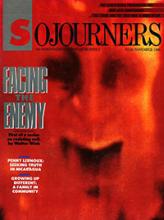I felt the terror of death. November 1969, on a darkening eve, we met upon a jungle trail. Our encounter startled each one of us. Two North Vietnamese soldiers braced to shoot me. Shaking, I wedged myself and my M-16 rifle against a tree. I shot them. "Oh, God," I groaned deeply. "What have I done? Why am I here?"
Family portraits were found on the lifeless, lacerated forms. In the long moments just after their deaths, I wondered about their mothers, their families, their friends. I was stricken with the truth I had always known: These Vietnamese men were persons, distinguished and unique individuals. They were fellow humans, not my enemies.
All night as I camped in the jungle, terrible, alien thoughts were coursing through my mind. I was sick and angry, hurt and sad for the dead men, their families, and for the American people who had sent me to kill them. I was out of harmony with goodness, with the universe, with sanity. Evil and corruption had grasped me. Evil had temporarily occupied me, engulfed me, dwelt in my body. I perceived its power to ruin. I experienced it. All of my being shuddered. I would never be the same. I hated my part in the killing.
Why did it happen? Why did I get into fighting in Vietnam? Even as I landed in the country in July 1969, I noticed the beauty of the land with its dense vegetation. Its people were wiry but delicate. I was somehow attracted to their rural, self-sufficient way of life. I can even remember sensing that they had something to teach me.
I was vaguely aware of the American peace movement's contention that the war was morally wrong. I knew that I didn't believe America should attack a peasant country that was alien in culture to us. I agreed that a poor, undeveloped country should not be displaced or obliterated.
Read the Full Article

